vendredi, 20 mars 2015
L’UTOPIA GEOPOLITICA DELL’ “IMPERO LATINO”
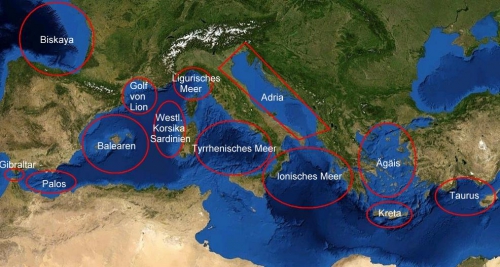
L’UTOPIA GEOPOLITICA DELL’ “IMPERO LATINO”
Davide Ragnolini
Ex: http://www.eurasia-rivista.org
Il Mar Mediterraneo, come topos del rapporto tra Europa e Vicino Oriente e con una naturale vocazione geopolitica di crocevia tra Nord e Sud del mondo, si presenta oggi al centro di un processo storico che vede un’ingerenza di attori atlantici, di natura “oceanica”.
Seguendo lo storico Mollat du Jourdin possiamo distinguere «due Mediterranei europei»,[i] cioè “due mari tra le terre” nel continente europeo. Di quello a nord aperto all’Oceano e «totalmente europeo»[ii] lo storico francese scrive: «i mari del Nord-ovest e del Nord europeo ritrovarono la loro vocazione ad essere il dominio del profitto e del potere, vocazione per altro mai dimenticata»;[iii] del Mediterraneo a sud, con il suo appellativo di mare nostrum, egli scrive che la sua natura sta nell’essere «un mare se non chiuso ad ogni modo incluso in un universo politico, dapprima unico, e centrato sull’Europa, e in seguito esteso all’Africa».[iv] Questo secondo Mediterraneo collocato nel Mezzogiorno dell’Europa si trova in una posizione geografica euro-afroasiatica che lo distingue da quello settentrionale sotto l’aspetto culturale ed antropologico conferendogli un carattere di unicità: «un mare su cui si affacciano tre continenti e tre religioni monoteistiche che non sono mai riuscite a prevalere l’una sull’altra».[v] Danilo Zolo osserva infatti che questo luogo sincretico di culture, popoli ed etnie differenti «come tale non è mai stato monoteista» e si presenta anzi come un «pluriverso irriducibile di popoli e di lingue che nessun impero mondiale oceanico può riuscire a ridurre ad unum».[vi] Nella misura in cui tale pluriverso ha un’unità storico-geografica ma non politica, economica e militare, la “deriva oceanica” del Mediterraneo si verifica attraverso un processo di erosione della sua unità, e sottrazione della suo spazio di autonomia geopolitica a favore di attori diversi da quelli dell’Europa mediterranea e del mondo arabo-musulmano.[vii] Questa considerazione geopolitica sull’unità del pluriverso mediterraneo deve essere congiunta con un’altra più specificamente storico-politica relativa alla crisi dello Stato-nazione, che Habermas, nel 1996, svolgeva nel seguente modo: «la sovranità degli stati nazionali si ridurrà progressivamente a guscio vuoto e noi saremo costretti a realizzare e perfezionare quelle capacità d’intervento sul piano sopranazionale di cui già si vedono le prime strutture. In Europa, Nordamerica e Asia stanno infatti nascendo organizzazioni soprastatali per regimi continentali che potrebbero offrire l’infrastruttura necessaria alla tuttora scarsa efficienza delle Nazioni Unite».[viii] Le entità sovrastatali a cui fa riferimento il liberale Habermas, apologeta dell’operato dell’Onu e dell’Ue, non sono le stesse delineate dal filosofo hegeliano Alexandre Kojève. Tuttavia la diagnosi dell’idea di Stato-nazione, assieme alla prima considerazione sull’unità del pluriverso mediterraneo, costituisce il punto di avvio dell’intuizione geopolitica del filosofo russo-francese nel suo L’impero latino. Progetto di una dottrina della politica francese (27 agosto 1945). Questo Esquisse d’une doctrine de la politique française fu pubblicato in versione dimidiata solo nel 1990 sulla rivista diretta da Bernard-Henry Lévy («La Regle du Jeu», I, 1990, 1). Su questo testo, pubblicato integralmente in italiano nel 2004 all’interno di una raccolta di scritti di Kojève intitolata Il silenzio della tirannide, anche il filosofo italiano Giorgio Agamben ha recentemente richiamato l’attenzione[ix]; tuttavia esso è passato pressoché inosservato all’interno dell’ideologia europeista dominante.
La stesura di questo abbozzo di dottrina geopolitica francese avvenne nell’agosto 1945, e trasse occasione dalla cooptazione di Kojève da parte di un suo ex-allievo nei negoziati dell’Avana per la creazione del GATT.[x] Due sono le preoccupazioni che Kojève espone all’inizio del suo scritto, e sono strettamente legate alle immediate circostanze storiche francesi: una, più remota, era quella relativa allo scoppio di una terza guerra mondiale in cui il suolo francese sarebbe potuto diventare campo di battaglia tra russi e anglosassoni; l’altra, più concreta, era costituita dalla crescita del «potenziale economico della Germania», per cui l’«l’inevitabile integrazione di questo paese – che si tenterà di rendere “democratico” e “pacifico” – all’interno del sistema europeo comporterà fatalmente la riduzione della Francia al rango di potenza secondaria».[xi] Il quadro giuridico-politico internazionale sul quale si delinea l’analisi di Kojève è quello della progressiva crisi dello Stato-nazione, prodotto dalla modernità politica a vantaggio di «formazioni politiche che fuoriescono dai limiti nazionali».[xii] Lo Stato moderno per poter essere politicamente efficace deve, in questo mutato quadro geopolitico, poter poggiare su una «vasta unione “imperiale” di nazioni imparentate».[xiii] A provare tale tendenza secondo Kojève sarebbe anche l’insufficienza dello sviluppo militare, sempre più determinata dai limiti economici e demografici su scala nazionale che rendono impossibile la gestione di eserciti in una fase post-nazionale. Ma il limite è evidentemente nell’idea stessa di Stato-nazione.
Nella lettura storica che egli diede della sconfitta del Reich tedesco viene messa in rilievo l’impossibilità da parte di uno Stato di preservare un’esistenza politica sulla limitata base di uno Stato-nazione e con la sua connessa «ideologia nazionalista».[xiv] Da questo punto di vista nella sua analisi, similmente a quella svolta dal secondo Carl Schmitt, interessato all’idea di Grossraum sul piano internazionale, vi è «la consapevolezza del deperimento della sovranità statuale».[xv] La stessa diagnosi dell’idea e della realtà storica dello Stato-nazione è data oggi da Alain de Benoist, per il quale l’unità artificiale dello Stato-nazione è diventata ormai un’istanza di mediazione inefficace tra le tendenze centrifughe di regionalismi e irredentismi etnolinguistici dal basso e la pressione dei mercati mondiali dall’alto.[xvi]
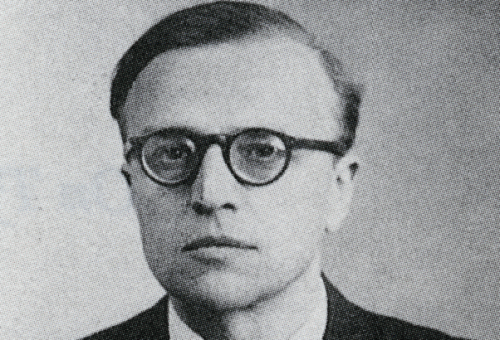
Secondo Kojève l’erosione dell’efficacia politica dello Stato-nazione si poté già scorgere da un lato nel liberalismo borghese, che affermava il primato della società di individui sull’autonomia politica dello Stato, dall’altro nell’internazionalismo socialista, che pensava di realizzare il trasferimento della sovranità delle nazioni all’umanità.[xvii] Secondo il filosofo francese, se la prima teoria si caratterizzò per miopia nel non vedere un’entità politica sovranazionale, la seconda fu ipermetrope nel non scorgere entità politiche al di qua dell’umanità. Kojève intuì che la nuova struttura politica statale che si stava configurando sarebbe costituita da imperi intesi come «fusioni internazionali di nazioni imparentate».[xviii] Da un punto di vista storico-filosofico il Weltgeist hegeliano, prima di poter incarnarsi nell’umanità, sembra dover assumere la forma dell’Impero,[xix] senza con ciò rinunciare alla propria teleologia di una metempsicosi cosmostorica tesa ad una comunità mondiale. Una concreta realizzazione storica di un’entità politica sorretta dalla mediazione tra universalismo e particolarismo geopolitico sarebbe stata rappresentata dall’«imperial-socialismo» di Stalin, che si contrappose sia all’astratto Stato-umanità di Trotzki, sia al particolarismo del nazional-socialismo tedesco.
All’imperial-socialismo sovietico, o impero slavo-sovietico, si contrappose un’altra efficace entità politica che Kojève qualifica come imperiale: l’«impero anglo-americano».[xx] Nell’acuta analisi precorritrice del filosofo francese, la «Germania del futuro», estinguendosi come Stato-nazione caratterizzato da esclusivismo geopolitico ed autonomia politica in base al principio postvestfaliano dello Stato come superiorem non reconoscens,[xxi] «dovrà aderire politicamente all’uno o all’altro di questi imperi».[xxii] Da un punto di vista culturale-religioso, la parentela che egli individua tra anglosassoni e tedeschi si fonderebbe sull’ispirazione protestante comune. Il problema che si pose Kojève fu dunque specificamente geopolitico e tuttora assolutamente attuale: scongiurare la riduzione della Francia a «hinterland militare ed economico, e quindi politico, della Germania, divenuta avamposto militare dell’impero anglosassone».[xxiii] L’orientamento della Germania verso l’impero anglo-americano si sarebbe potuto osservare negli sviluppi storici e geopolitici successivi.
Ma nell’analisi dell’hegeliano francese, il problema della riduzione della sovranità coinvolgerebbe conseguentemente le altre nazioni dell’Europa occidentale «se si ostineranno a mantenersi nel loro isolamento politico “nazionale”».[xxiv] Il progetto politico proposto da Kojève è teso quindi alla creazione di una terza potenza tra quella ortodossa slavo-sovietica e quella protestante germano-anglo-sassone: un impero latino alla cui testa possa porsi la Francia al fine di salvaguardare la propria specificità geopolitica assieme a quella di altre nazioni latine, minacciate da un bipolarismo mondiale che preme su uno spazio mediterraneo da oriente e da occidente.
La vocazione di tale progetto imperiale non potrebbe però avere un carattere imperialistico, perché non sarebbe capace di un sufficiente potere offensivo verso gli altri due imperi, ma avrebbe piuttosto la funzione di preservare la pace e l’autonomia geopolitica di un’area che si sottrae al pericolo di egemonie imperialistiche esterne impedendo che il proprio spazio diventi campo di battaglia di Asia e Pacifico.[xxv] L’analisi della situazione della Francia svolta da Kojève rivela però alcune precise difficoltà di realizzazione di questo progetto politico. Secondo il filosofo francese alla «fine del periodo nazionale della storia»[xxvi], che peraltro la Francia faticherebbe a riconoscere, si aggiunge un processo di «spoliticizzazione» del Paese, cioè di perdita della volontà politica ed una conseguente decadenza sotto il piano sociale, economico e culturale. Un progetto sovranazionale implica un dinamismo diplomatico e uno sforzo di mediazione culturale di cui i paesi latini si devono assumere l’impegno. La parentela che Kojève scorge tra le nazioni latine come Francia, Italia e Spagna, e che costituisce l’elemento coesivo di un progetto di entità politica postnazionale, è caratterizzato da un punto di vista culturale da «quell’arte del tempo libero che è l’origine dell’arte in generale».[xxvii] Tale peculiarità dell’«Occidente latino unificato»[xxviii] sarebbe un aspetto identitario omogeneo ai Paesi latini e rimarrebbe ineguagliato dagli altri due imperi. Per questa ragione antropologico-culturale Danilo Zolo può affermare che «l’area mediterranea vanta la più grande concentrazione artistica del mondo».[xxix]
Più in generale, secondo Kojève la formazione di entità politiche imperiali dopo lo Stato-nazione è rafforzata dalla coesione di queste nazioni imparentate con le Chiese più o meno ufficiali ad esse corrispondenti.[xxx] Questa parentela o unione latina può diventare un’entità politica reale solo formando un’autentica unità economica, condizione materiale di esistenza di tale progetto sovranazionale. Ben lungi dall’essere un vettore di conflitto, tale impero latino potrebbe garantire un’intesa politicamente efficace tra culture diverse ma unite nello stesso spazio di appartenenza e comunità di destino. È su questa identità geopolitica comune che è possibile pensare ad un efficace antidoto contro l’idea di clash of civilizations, costitutivamente estranea all’area mediterranea: «un’intesa tra la latinità e l’islam – scrisse Kojève – renderebbe singolarmente precaria la presenza di altre forze imperiali nel bacino mediterraneo».[xxxi]

Da questo punto di vista identitario-culturale, la considerazione sull’esigenza di unità economica nell’area latina delineata dal filosofo francese è ben lontana dal liberalistico primato dell’economico sul politico che si è affermato ed istituzionalizzato successivamente nell’Unione europea. L’unione economica dei Paesi latini è infatti pensata solo come condizione, mezzo dell’unità imperiale latina, non come una sua ragion d’essere, perché il fine ultimo di questa è essenzialmente politico ed è sorretto da un’ideologia specifica. Categoria fondamentale dell’ideologia dell’unità imperiale latina è l’indipendenza e l’autonomia, alla quale si rivelano subordinati altri aspetti come quelli di potenza e di grandezza. Una politica militarista secondo Kojève tradisce una insicurezza e minaccia di instabilità che la formazione di un progetto sovrastatale mediterraneo dovrebbe allontanare: «il militarismo nasce dal pericolo e soprattutto dalla sconfitta, cioè da una debolezza solo probabile o già verificatasi».[xxxii] Per questa ragione il fenomeno di militarismo ed imperialismo viene da Kojève rigettato come «meschino», e spiegato come il riflesso di uno Stato-nazione fragile e non di una struttura politica imperiale.
A tale impero latino dovrà corrispondere un esercito sovranazionale «sufficientemente potente da assicurargli un’autonomia nella pace e una pace nell’autonomia» e non nella dipendenza di uno dei due imperi rivali.[xxxiii] Come già rilevato sopra, la potenza militare dell’impero latino né potrebbe, né dovrebbe avere carattere offensivo, ma piuttosto un carattere difensivo riferito ad una concreta localizzazione nello spazio: «l’idea di un Mediterraneo “mare nostrum” potrebbe e dovrebbe essere il fine concreto principale, se non unico, della politica estera dei latini unificati […] si tratta di detenere il diritto e i mezzi di chiedere una contropartita a coloro che vorranno circolare liberamente in questo mare o di escluderne altri. L’accesso o l’esclusione dovranno dipendere unicamente dall’assenso dell’impero latino grazie ai mezzi di cui esso solo può disporre».[xxxiv] L’isolamento dei singoli paesi latini non li farebbe altro che naufragare sul blocco imperiale anglo-sassone, trasformandoli in «satelliti nazionali»[xxxv] di una delle due formazioni imperiali straniere. Interessante è l’osservazione di Kojève sul pericoloso potenziale di squilibrio geopolitico ed economico che la Germania può costituire rispetto ai Paesi latini e all’Europa intera: «se il pericolo di una Germania nemica sembra essere scongiurato per sempre, il pericolo economico rappresentato da una Germania “alleata” affrontato all’interno di un blocco occidentale che sia un’emanazione dell’impero anglosassone non è affatto chimerico, mentre rimane, anche sul piano politico, incontestabilmente mortale per la Francia»[xxxvi] e per gli altri Paesi latini. L’impero latino come entità politica autonoma potrebbe essere in grado di «opporsi in maniera costante ad un’egemonia continentale tedesca» o anglo-americana.
L’idea di impero latino non deve cioè essere connessa ai limiti di un anacronistico Stato-nazione, ma riferito a «fusioni internazionali di nazioni imparentate»[xxxvii] o «unione internazionale di nazioni imparentate».[xxxviii).
I problemi politici interni che ostacolerebbero il progetto di impero latino in Francia sarebbero secondo Kojève costituiti sia dal «quietismo economico e politico» che paralizza l’intraprendenza politica del Paese, cioè ostacolano «l’attività negatrice del dato, quindi creatrice e rinnovatrice», sia da formazioni partitiche che si rivelano essere «tanto più intransigenti nel loro atteggiamento quanto meno questo è dottrinale».[xxxix] La compresenza di questi due aspetti agirebbe in modo ostativo rispetto al progetto di impero latino, e non possiamo certo dire che oggi, sotto l’esperienza del commissariamento tecnico-economico dei governi e nella caotica frammentarietà di partiti deideologizzati la situazione possa definirsi più idonea sul piano fattuale per la costruzione di un progetto geopolitico sovranazionale alternativo.
Nell’analisi che Kojève svolge sulla possibile collaborazione ed idoneità dei vari partiti politici esistenti in Francia rispetto al progetto di impero latino, di grande rilievo è il rapporto che viene delineato tra formazione imperiale e Chiesa. Nella nascente fase storica di formazione di imperi post-nazionali le Chiese cristiane tra loro separate sembrano abbisognare dell’esistenza di compagini intermedie tra l’umanità e le nazioni.[xl] Si potrebbe quindi osservare un isomorfismo strutturale dal punto di vista geopolitico tra le Chiese separate e le formazioni imperiali: né universalistici, né limitati in un’anacronistica idea di Stato-nazione. La Chiesa cattolica, in questo quadro geopolitico in cui i movimenti imperiali rappresentano l’attualità, acquisirebbe «il patrocinio spirituale dell’impero latino»[xli] e, tenendosi salda alla propria natura di Chiesa potenzialmente universale, ricorderebbe all’impero latino il suo carattere storicamente transitorio all’interno dello sviluppo storico. Il progetto di impero latino nella sua configurazione storica e geopolitica si differenzia dal Grossraum schmittiano per il fatto che esso non esercita, o almeno non primariamente, la funzione di katechon[xlii] perché da un punto di vista geopolitico rappresenta «la forma intermedia tra Vestfalia e Cosmopolis»,[xliii] e sul piano storico «prepara e anticipa lo stato mondiale».[xliv]
Questo progetto per una dottrina geopolitica francese e mediterranea seppur si inquadri in un rapporto di opposizione all’unipolarismo anglo-americano e sia schiettamente orientato in una prospettiva multipolare, dal punto di vista storico-escatologico diventa vettore di realizzazione dell’idea di Stato-umanità secondo l’umanismo filosofico di Kojève.
L’8 maggio di quest’anno, a proposito del progetto geopolitico di questo singolare «marxiste de droite»[xlv], è apparso sulla rivista tedesca Die Welt un articolo che, al contrario di quello di Agamben, non è affatto passato inosservato. Il sociologo tedesco Wolf Lepenies,[xlvi] nella sua risposta al duro documento del Partito socialista francese contro il dogma economico dell’austerità tedesca, chiama in causa la dottrina geopolitica di Kojève di un’unione contro la Germania, che sembrerebbe acquisire fama e simpatie presso la sinistra francese e troverebbe risonanza presso il filosofo italiano Agamben. L’articolo di Lepenies è critico anche verso l’intuizione kojèviana di una Germania che persegue i propri vantaggi economici all’ombra di un blocco euro-atlantista. Tale episodio è significativo sul piano negativo: un articolo di un quotidiano tedesco conservatore di oggi, fondato dalle forze inglesi vincitrici nel 1946, rivolto contro il progetto geopolitico alternativo da un filosofo francese pensato nel dopoguerra non può che assumere rilievo sotto il profilo della teoria geopolitica contemporanea. Il binomio Germania-Eurolandia, col suo potenziale destabilizzante per il continente europeo e in particolare per i paesi mediterranei europei, può essere ridiscusso solo a partire dalla critica al suo fondamento geopolitico euro-atlantista, come intuì Kojève all’indomani della Seconda Guerra Mondiale.
[i] MOLLAT DU JOURDIN M., L’Europa e il mare dall’antichità ad oggi, Laterza, Roma-Bari, 2004, p. 14.
[ii] Ivi, p. 29.
[iii] Ivi, p. 66.
[iv] Ivi, p. 29.
[v] ZOLO D., Per un dialogo fra le culture del Mediterraneo in AA. VV., Mediterraneo. Un dialogo tra le sponde, a cura di F. Horchani e D. Zolo, Jouvence, Roma, 2005, p. 18.
[vi] Ibidem.
[vii] Cfr. ZOLO D., La questione mediterranea, in AA. VV., L’alternativa mediterranea, a cura di F. Cassano e D. Zolo, Feltrinelli, Milano, 2007, pp. 18-21. Cfr. anche l’interessante intervista di Alain de Benoist rivolta a Danilo Zolo su questo tema reperibile nel seguente sito: http://www.juragentium.org/topics/med/it/benoist.htm.
[viii] HABERMAS J., Lo stato-nazione europeo. Passato e futuro della sovranità e della cittadinanza in ID., L’inclusione dell’altro. Studi di teoria politica, Feltrinelli, Milano, 1998, pp. 120-121.
[ix] Il titolo dell’articolo di Giorgio Agamben apparso su Repubblica il 15 marzo di quest’anno si intitola “Se un impero latino prendesse forma nel cuore dell’Europa”, ed è reperibile nel seguente sito: http://ricerca.repubblica.it/repubblica/archivio/repubblica/2013/03/15/se-un-impero-latino-prendesse-forma-nel.html.
[x] TEDESCO F., L’impero latino e l’idea di Europa. Riflessioni a partire da un testo (parzialmente) inedito di Alexandre Kojève, in AA. VV., Quaderni fiorentini per la storia del pensiero moderno, vol. XXXV, Giuffrè Editore, Milano, 2006, p. 379.
[xi] KOJÈVE A., L’impero latino. Progetto di una dottrina della politica francese, in ID., Il silenzio della tirannide, Adelphi, Milano, 2004, p. 163.
[xii] Ivi, p. 164.
[xiii] Ivi, p. 165.
[xiv] Ivi, pp. 167-168.
[xv] TEDESCO F., L’impero latino e l’idea di Europa. Riflessioni a partire da un testo (parzialmente) inedito di Alexandre Kojève, in op. cit., p. 393.
[xvi] Cfr. DE BENOIST A., L’idea di Impero, in AA. VV., Eurasia. Rivista di studi geopolitici, n.° 1/2013.
[xvii] KOJÈVE A., L’impero latino. Progetto di una dottrina della politica francese, in op. cit., pp. 168-169.
[xviii] Ivi, p. 169.
[xix] Ivi, p. 170.
[xx] Ivi, p. 171.
[xxi] ZOLO D., Globalizzazione. Una mappa dei problemi, Laterza, Roma-Bari, 2009, p. 68.
[xxii] KOJÈVE A., L’impero latino. Progetto di una dottrina della politica francese, in op. cit., p. 172.
[xxiii] Ivi, p. 173.
[xxiv] Ivi, p. 174.
[xxv] Ivi, p. 175.
[xxvi] Ivi, p. 179.
[xxvii] Ivi, p. 183.
[xxviii] Ivi, p. 184.
[xxix] ZOLO D., La questione mediterranea, in AA. VV., L’alternativa mediterranea, op. cit., p. 17.
[xxx] KOJÈVE A., L’impero latino. Progetto di una dottrina della politica francese, in op. cit., p. 185.
[xxxi] Ivi, p. 188.
[xxxii] Ivi, p. 193.
[xxxiii] Ibidem.
[xxxiv] Ivi, p. 195.
[xxxv] Ivi, p. 196.
[xxxvi] Ivi, p. 197.
[xxxvii] Ivi, p. 169.
[xxxviii] Ivi, p. 181.
[xxxix] Ivi, p. 198.
[xl] Ivi, p. 208.
[xli] Ivi, p. 209.
[xlii] SCHMITT C., Il nomos della terra nel diritto internazionale dello “jus publicum europaeum”, a cura di Franco Volpi, Adelphi, 2003, p. 42 e sgg.
[xliii] TEDESCO F., L’impero latino e l’idea di Europa. Riflessioni a partire da un testo (parzialmente) inedito di Alexandre Kojève, in op. cit., p. 394.
[xliv] Ivi, p. 398.
[xlv] AUFFRET D., Alexandre Kojève, La philosophie, l’État, la fin de l’Histoire, Paris, Grasset, 1990, p. 423, cit. in TEDESCO F., L’impero latino e l’idea di Europa. Riflessioni a partire da un testo (parzialmente) inedito di Alexandre Kojève, in op. cit., p. 401.
[xlvi] Cfr. http://www.welt.de/kultur/article115976016/Frankreichs-Linke-traeumt-von-Anti-Deutschland-Bund.html; a questo articolo di Lepenies fa riferimento anche un articolo del “Corriere della sera” apparso il giorno successivo http://www.corriere.it/opinioni/13_maggio_09/lepri-incubo-tedesco-fantasma-latino_00e745be-b877-11e2-8563-aab5ecf30b92.shtml.
00:05 Publié dans Actualité, Affaires européennes, Philosophie, Théorie politique | Lien permanent | Commentaires (0) | Tags : europe, affaire européennes, empire, notion d'empire, empire latin, empire catholique, alexandre kojève, kojève, philosophie, philosophie politique, géopolitique, politique internationale, théorie politique, politologie, sciences politiques |  |
|  del.icio.us |
del.icio.us |  |
|  Digg |
Digg | ![]() Facebook
Facebook
samedi, 28 février 2015
A Hole in Being: Notes on Negativity
A Hole in Being:
Notes on Negativity
By Greg Johnson
Ex: http://www.counter-currents.com
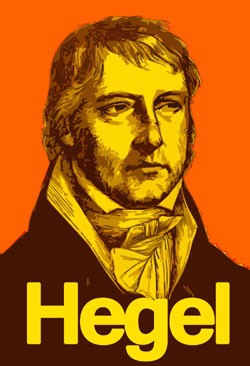 G. W. F. Hegel and his able interpreter Alexandre Kojève claim that the essence of consciousness is “negativity,” that man lives “outside himself,” that man “negates” or “nihilates” nature, that man is a “nothingness” or a “hole in being,” that man is “time that negates space.” What does this mean?
G. W. F. Hegel and his able interpreter Alexandre Kojève claim that the essence of consciousness is “negativity,” that man lives “outside himself,” that man “negates” or “nihilates” nature, that man is a “nothingness” or a “hole in being,” that man is “time that negates space.” What does this mean?
First, let’s consider the claim that man contains a negativity or absence within him. Imagine you are holding a rock in your hand. A rock is a paradigmatic natural object. It is an inert lump of matter. A rock is complete and self-contained. To say that the rock is self-contained is to say that it does not need anything from outside of itself in order to go on being a rock. A plant, by contrast, is not self-contained; it needs things outside of itself—water, nutrients, sunlight—in order to go on being a plant. Without these things, it is reduced to a mass of inert matter, like the rock.
To say that the plant is not self-contained and self-sufficient is to say that it has an absence or lack within it; its need is a hole in it that must be filled by something from outside it. The rock, because it has no needs, is wholly self-sufficient and self-contained; it has no absences within it.
Another way of understanding this is to say that what makes the plant whole lies outside of its skin, outside of the space that it inhabits and occupies; what makes the plant whole is literally outside it; the plant is outside of itself, displaced from the physical space that it occupies; another way of putting this is to say that the plant is “ecstatic,” for the word “ecstatic” literally means “out-standing,” being outside of or beside oneself.
The rock, by contrast, is not ecstatic; because it needs nothing from outside itself to make it complete, all that it is lies within the physical space it occupies. To understand a plant as a whole, one cannot simply look at the plant, for what the plant is, is not wholly within its skin; the things that make the plant a whole are found outside it, in the needs which are fulfilled from the environment in which it dwells.
When Hegel/Kojève claim that man contains negativity and absence in him, they mean, first of all, that man has needs and desires, that man is not wholly self-sufficient and self-contained. Human beings lie outside of themselves, outside of their skins, for it is only outside of ourselves that we find those things which fulfill our needs and make us complete.
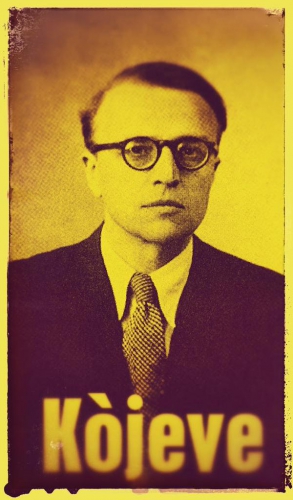 Next, let’s consider the ideas of “negating” and “nihilating” nature. When a plant or an animal finds something from the external world that fulfills its needs, it must remove that thing from the outside world and transform and incorporate it into itself. Hegel and Kojève refer to this activity as “negating,” i.e., saying “no.”
Next, let’s consider the ideas of “negating” and “nihilating” nature. When a plant or an animal finds something from the external world that fulfills its needs, it must remove that thing from the outside world and transform and incorporate it into itself. Hegel and Kojève refer to this activity as “negating,” i.e., saying “no.”
A plant transforms sunlight, nutrients, and water into something that they are not; it in effect says “no” to them as they are given and transforms them into something it can use; it says “no” to their objective, external being and makes them part of itself.
When a cow eats the plant, it says “no” to the plant as an objective, external being and incorporates it into itself.
When a human being takes a rock and transforms it into a paperweight or an example, we say “no” to its objective, external being and incorporate it into the network of human meanings and purposes.
Now what does it mean to say that man is “time” that negates “space”? To understand this, we must appreciate an essential difference between human beings and other kinds of beings. All living things, save for human beings, have needs which are given by nature and which are satisfied within the natural world. Animals may say “no” to given nature, but it is only to satisfy their natural needs, so the process of negation is situated within and bounded by the order or economy of nature.
This is not the case with human beings. Human beings have naturally given needs. But we also have needs which are not given by nature and which cannot be satisfied by given nature. Human beings, unlike all other living things, can say “no” to their own naturally given needs—to their animal natures—and to the entire economy of the natural world. Among the strongest human needs are for physical survival and biological propagation. But Human beings say “no” to the real in the name of the unreal or the unrealized, of the ideal or the idealized.
Human beings have the power of language, reason, speech, abstraction, invention, creativity, logos—what Hegel calls the realm of the concept—which allows them to create needs, ideals, and plans which are not based on nature and cannot be satisfied by it. They can be satisfied only by the transformation of the natural world through work. It is here that the dimension of time enters in.
Hegel claims that:
Man = Negativity = Time = Concept
To say that the concept = time is to say that the concept is a plan, a blueprint for a process of transforming what is given in the present into what is desired in the future. To say that man = time is to say that man’s unique mode of being, man’s unique mode of negativity, is the transformation of the natural world through our projects. Man, therefore, is time that negates.
But what does it mean to say that man is time that negates space? By space, Hegel/Kojève mean nature, given being, inert reality, which is to be changed in light of our concepts and plans. Hegel/Kojève use “space” to designate given being, because given beings, unlike living beings, are wholly self-contained and self-sufficient; because they need nothing outside of themselves to be complete, all that they are is found within their given spatial location.
To say that man is time that negates space, is, therefore, to say that man is time that negates given being in the light of his concepts and plans. We say “no” to what is given now in the name of the not yet, what is conceived in the mind and realized through the transformation of given nature.
There is a phrase from Jean-Paul Sartre that is often quoted by people who want to argue that French philosophy is all a bunch of gobbledygook:
Man is what he is not and is not what he is.
On the surface this does sound like nonsense, but it actually makes a great deal of Kojèvian sense.
To say that man is what he is not, is to say that human beings are not just lumps of inert given being; human beings have physical-material-animal bodies, but the body is simply the site at which a potential of infinity of plans and projects burst out in all directions, toward myriad possible futures.
Human beings are what they are not because they live in their plans and projects, encountering their given reality as incomplete in light of all the things they want to achieve.
Human beings are not what they are—i.e., the given matter within our skins—because what we are is radically incomplete, and can be completed only by completing our plans and projects, and since we always have uncompleted plans and projects, which are cut off only by death, man is always incomplete, a hole in being that will never be fully filled.
Article printed from Counter-Currents Publishing: http://www.counter-currents.com
URL to article: http://www.counter-currents.com/2015/02/a-hole-in-being/
URLs in this post:
[1] Image: http://www.counter-currents.com/wp-content/uploads/2015/02/book-transforming-itself-into-a-nude-woman-1.jpg
00:05 Publié dans Philosophie | Lien permanent | Commentaires (0) | Tags : philosophie, hegel, kojève, négativité, hegelianisme, philosophie politique |  |
|  del.icio.us |
del.icio.us |  |
|  Digg |
Digg | ![]() Facebook
Facebook
mardi, 24 février 2015
Why Read Hegel?
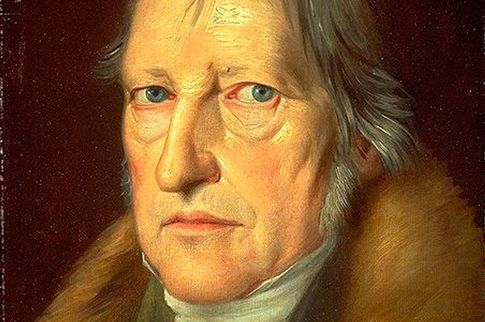
Why Read Hegel?
Notes on the “End of History”
By Greg Johnson
Ex: http://www.counter-currents.com
Georg Wilhelm Friedrich Hegel (1770–1831) has had a tremendous influence on the modern world, not only in the history of ideas, but in the political realm as well. How big an influence? Without Hegel, there would have been no Marx; without Marx, no Lenin, no Mao, no Castro, no Pol Pot. Now, reflect just a moment on the difference the Communism has made in the modern world, even in non-Communist countries, whose policies were deeply motivated by the desire to defeat Communism.
Communism is without a doubt the most important and influential, not to mention deadly, political innovation in the 20th century; and, before Marx, some of its intellectual foundations were laid by Hegel. I should add, however, that Hegel would have rejected Marxism and thus cannot be held responsible for the lesser minds influenced by him; furthermore, not all aspects of his cultural and political legacy are so negative; and, rightly understood, Hegel has the potential to exercise an immensely positive influence on modern politics and culture.
Outwardly, Hegel did not live a particularly interesting life. He was born in 1770 in Stuttgart, to an educated, middle-class family of lawyers, civil servants, and Lutheran pastors. He was educated at the University of Tübingen, first as a seminarian. He shared rooms with Friedrich Wilhelm Joseph Schelling and Friedrich Hölderlin, who also made huge contributions to German philosophy and letters. Having completed the equivalent of a Ph.D. in philosophy, he held a series of tutoring positions, collaborated on a couple of journals, inherited and spent his patrimony, and found himself broke and approaching his middle thirties.
Salvation came in the form of a book contract with a healthy advance but a draconian penalty for lateness. Hegel started writing . . . and writing . . . and writing. His outlined work got out of hand; each chapter became bigger than the last, and Hegel found himself dangerously close to his deadline, writing feverishly to finish his work, when outside the city where he resided, Napoleon fought and defeated the Prussian army at the Battle of Jena. In the midst of chaos, as French troops were occupying the city, Hegel bundled up the only copy of his manuscript and put it in the mail. It reached the publisher, and the next year, in 1807, Hegel’s most celebrated work, Phenomenology of Spirit, was published.
Phenomenology of Spirit is one of the classic works of German idealism: more than 500 prolix, rambling, tortured, and mind-bogglingly obscure pages. My copy is covered with dents from the times I hurled it against the wall or floor in frustration. Hegel is, without a doubt, the worst stylist in the history of philosophy. Unlike Kant, who could write well when he wanted to but often chose not to, Hegel could not write a clear sentence to save his life. Heinrich Heine reports that on his deathbed, Hegel is said to have sighed, “Only one man has understood me.” But then, a few minutes later, he added fretfully, “And even he did not understand me.” Never has so much been misunderstood by so many.
Phenomenology of Spirit laid the foundations for Hegel’s philosophical system and for his academic career and reputation, but it was only after 10 years that he received an academic position. For the rest of his life he lectured, he wrote, and he published. And then, in 1831, he died. Now, at this point, with any other author’s story, I would conclude by saying, “and the rest is history.” But in Hegel’s case, it is not so simple.
Phenomenology of Spirit
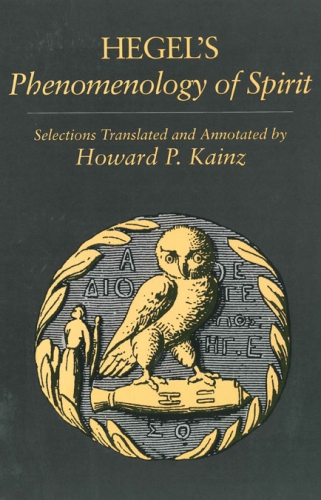 Given its formidable difficulties, why would anyone trouble read a book like Phenomenology of Spirit? Because, if Hegel is right, then world history comes to an end with the writing of his book. Specifically, Hegel held that the battle of Jena brought world history to an end in the concrete realm because it was the turning point in the battle between the principles of the French revolution—liberty, equality, fraternity, secularism, and progress—and the principles of traditional absolutism, the so-called throne-altar alliance.
Given its formidable difficulties, why would anyone trouble read a book like Phenomenology of Spirit? Because, if Hegel is right, then world history comes to an end with the writing of his book. Specifically, Hegel held that the battle of Jena brought world history to an end in the concrete realm because it was the turning point in the battle between the principles of the French revolution—liberty, equality, fraternity, secularism, and progress—and the principles of traditional absolutism, the so-called throne-altar alliance.
Napoleon was, for Hegel, the World Spirit made incarnate, on a horse. Napoleon did not, however, understand his significance. But Hegel did. And when Hegel understood the world historical significance of the principles of the French Revolution and their military avatar, Napoleon, and wrote it down in Phenomenology of Spirit, he believed that the underlying purpose of history had been fulfilled. Just as Christ was the incarnation of the divine logos, so is the historical world—and the book—brought about by the French Revolution the incarnation of the logos of human history, and Hegel and Napoleon played the role of the Holy Spirit, mediating the two, making the ideal (the concept) concrete.
Now, at first glance—and maybe at second glance—all of this must seem quite mad. There is more madness to come. But I think that if your experience is like mine, you will find that these claims, which initially seem so mad, have a certain method to them, and even a logic. Hegel and his most able and charismatic expositor Alexandre Kojève exercise a strange fascination, which I hope you will come to share. If they were mad, then I hope to convince you that they had cases of divine madness.
What is “History”?
The main reason for reading Hegel is that he provides deep insights into the philosophy of history and culture. But what does Hegel mean by “history”? If history is something that can come to an end through a battle and a book, then Hegel must have a very specific—and very peculiar—conception of history in mind. This is true.
History, for Hegel, is the history of fundamental ideas, basic interpretations of human existence, interpretations of mankind and our place in the cosmos; basic “horizons” or “worldviews.” History for Hegel is equivalent to what Heidegger calls the “History of Being”—“Being” being understood here as fundamental and hegemonic worldviews. For uniformity’s sake, I shall say that Hegelian history is the history of “fundamental interpretations of human existence.” When these interpretations are explicitly articulated in abstract terms, they are what we call philosophies.
But it would be a mistake to think of these fundamental interpretations of human existence merely as abstract philosophical positions. They can also be found in less-abstract articulations, such as myth, religion, poetry, and literature. And they can be concretely embodied: in the form of art and architecture and all other cultural productions, as well as in social and political institutions and practices.
Indeed, Hegel holds that these fundamental interpretations of existence exist for the most part in concrete, rather than abstract form. They exist as “tacit” presuppositions embedded in language, myth, religion, custom, etc. Although these can be articulated at least in part, they need not be and seldom fully are. These fundamental interpretations of existence are what Nietzsche calls “horizons”: unspoken, unarticulated, unreflective attitudes and values that constitute the bounding parameters and vital force of a culture.
History for Hegel does include more concrete and mundane historical facts and events, but only insofar as these embody fundamental interpretations of human existence—and there are few things in the world that do not embody such interpretations. Even the stars, which would seem to fall into the realms of natural science and natural history, fall into human history and the human world, insofar as they are construed from the point of view of the earth, and through the lenses of different myths and cultures, as constellations, portents, or even gods. Indeed, since all of the sciences are themselves human activities, and the sciences interpret all of nature, all of nature falls within the human world.
The “Human World”: Idea, Spirit
I have been using the expression “the human world.” What does this expression mean? The human world means the world of nature as interpreted by human reason and as transformed by human work. The human world comes into being when men appropriate nature, when we make it our own by endowing it with meaning and/or transforming it through work, thereby integrating it into the web of human concerns, human purposes, and human projects.
This process can be quite simple. A rock in your driveway is simply a chunk of nature. But it can be brought into the human world by endowing it with a purpose. One can use it as a paperweight; or one can use it as an example in a lecture. By doing this, I have appropriated the rock, lifting it out of the natural world, where it has no purpose and no meaning, and bringing it into the human world, where it has purpose and meaning.
Hegel’s primary concern as a philosopher is with the human world. Now, Hegel is known as an “idealist.” Idealism is generally held to be a thesis that the world is made of “idea stuff.” And “idea stuff” is supposed to be something ghostly, numinous, immaterial, mental. Does this mean that Hegel held that the human world was somehow numinous and abstract?
No, Hegel is not that kind of idealist. Hegel has a very peculiar way of using the world “idea” (Idee). When Hegel talks about ghostly, immaterial abstract mental “ideas” he uses the German word “Begriff,” which is well-translated “concept.” And concepts are distinct from, though related to Ideas. Hegel’s understanding of the distinctness and the relatedness of concepts and Ideas can be expressed by the following equation:
Concept + Concrete = Idea
Ideas for Hegel are not abstract and numinous, because the Hegelian Idea consists of chunks of solid, concrete reality interpreted, worked over, and otherwise transformed in the light of concepts. Or, conversely formulated, the Hegelian Idea consists of concepts that have been concretely realized in reality, whether by deploying concepts merely to interpret reality or as blueprints for transforming it. The Hegelian Idea is identical to the human world, and the human world is the world of concrete natural objects interpreted and transformed by human beings.
Another term that Hegel uses as equivalent to Idea is “Spirit.” Again, this word has an abstract and numinous connotation, but not for Hegel. For Hegel, Spirit and Ideas can be as solid and concrete as a rock, so long as the rock has been transformed in light of human concepts. So the aforementioned rock/paperweight is a chunk of Spirit, a chunk of Idea. History proper is not, however, the history of mundane concepts, mundane Ideas, and humble chunks of Spirit like a paperweight. History is the history of fundamental concepts, fundamental Ideas: fundamental interpretations of human existence, both as abstractly articulated and as concretely embodied.
To sum up:
The Human World = Spirit = Idea = Concepts + Concretes
History as Dialectic
Hegel claims that all fundamental interpretations of human existence that fall within history are partial and inadequate interpretations, which are relative to time, place, and culture. This is the position known as “historicism”; it is the source of the commonplace assertion that a person or a cultural production is a creature or product of a particular time and culture.
Since there is a plurality of distinct and different times, places, and cultures, there is also a plurality of distinct and different fundamental interpretations of human existence. The existence of a plurality of different interpretations of human existence on the finite surface of a globe means that eventually these different interpretations and the cultures that concretize them will come into contact—and, inevitably, into conflict—with one another.
History is the record of these confrontations and conflicts between different worldviews. It follows, then, that the logical structure of history is identical with the logical structure of the conflict of different worldviews. The logical structure of the conflict of different worldviews is called “dialectic.” History, therefore, has a dialectical structure.
Dialectic is the logic of conversation. It is the process whereby partial and inadequate perspectives work for mutual communication and intelligibility, thereby creating a broader, more-encompassing and adequate perspective.
Dialectic is the process whereby different individual or cultural perspectives, with all of their idiosyncrasies, work their way toward a more encompassing common perspective.
Dialectic is the process wherein largely tacit cultural horizons—myth, religion, language, institutions, traditions, customs, prejudices—are progressively articulated and criticized, casting aside the irrational, idiosyncratic, parochial, and adventitious in favor of the universal, rational, and fully self-conscious.
What drives the process forward is the search for an interpretation of human existence that is adequate to our nature. It is the search for a true understanding of human existence. And this presupposes that human beings have a fundamental need for a correct understanding of themselves and their world, a need which drives the dialectic forward.
Now, since fundamental interpretations of human existence take the form not merely of abstract theories, but concrete institutions, practices, cultures, and ways of life, the dialectic between these worldviews is not carried on merely in seminars, symposia, and coffee houses. It is carried on in the concrete realm as well in the form of the struggles between different political parties, interest groups, institutions, social classes, generations, cultures, forms of government, and ways of life, insofar as these embody different conceptions of human existence. The struggle is carried on in the form of peaceful rivalries and social evolution—and in the form of bloody wars and revolutions—and in the form of the conquest and annihilation or assimilation of one culture by another.
Absolute Idea, Absolute Spirit, and the End of History
If all fundamental interpretations of human existence in history are partial, inadequate, and relative to particular times and cultures, this implies that if and when we arrive at an interpretation of human existence that is comprehensive and true, then we have somehow stepped outside of history. If history is the history of fundamental ideological struggle, then history ends when all fundamental issues have been decided.
In the abstract realm, the realm of concepts, the end of history comes about when a final, true, and all-encompassing interpretation of human existence is articulated. This interpretation, unlike all the others that came before it, is not partial or relative but Absolute Truth, the Absolute Concept. It is important to note that the Absolute Truth, unlike all previous partial and relative truths, does achieve a wholly articulated form; it is not a merely tacit and unarticulated cultural horizon; it is fully articulated, all-encompassing system of ideas.
However, just because the absolute truth is wholly articulated in abstract terms, that does not imply that it exists in the abstract realm only. The Absolute Concept is also realized in the concrete realm as well. In the concrete realm, Absolute Truth is realized at the end of history in the form of a universal, and in all important respects, homogeneous, world civilization.
This does not necessarily mean a world government. Distinct nations may remain, but only insofar as their existence is fundamentally unimportant. For in all important things—that is, in all issues relating to the correct interpretation of human nature and our place in the world—uniformity reigns. Hegel calls the post-historical world in which the Absolute Truth is concretely realized “Absolute Idea” and “Absolute Spirit.”
Hegel does not hold that Absolute Truth and Absolute Spirit are mere possibilities, the speculations of an agile and perhaps fevered mind. He holds that they are already actual. The Absolute Truth is to be found—where else?—in Hegel’s writings. Specifically, it is to be found in his Encyclopedia of the Philosophical Sciences. The Phenomenology of Spirit is only a ladder leading up to Absolute Truth, proving that it is and what it must be like, but giving no specifics. And, as we have seen, Hegel holds that ideological history comes to an end with the ideals of the French Revolution: the universal rights of man; liberty, equality, and fraternity; secularism and scientific and technological progress.
The fundamentally scientific and technological character of Absolute Spirit/Idea cannot be stressed enough. A particular chunk of Idea/Spirit equals a chunk of nature, of given reality, transformed by human discourse and/or human work. Absolute Idea/Spirit therefore equals the totality of nature transformed by human discourse and work, i.e., by science and technology.
Now, this is not to say that Absolute Spirit comes into being only after the entire universe has been scientifically understood and technologically appropriated and transformed, for this is an infinite task. Rather, Absolute Spirit comes into being by setting up the infinite task of understanding and transforming nature; Absolute Spirit consists of a way of framing nature as, in principle, infinitely knowable by science and, in principle, infinitely malleable by technology. All limitations encountered in the unfolding of this infinite task are encountered as merely temporary impediments what can always, in principle, be overcome by better science and better technology. Hegel, like all the other great philosophers of modernity, is a good Baconian.
The end of history does not mean the end of history in the more mundane sense. The newspaper will still come in the morning, but it will look more like the Atlanta Journal than the New York Times: a global village tattler, chronicling untold billions of treed cats, weddings, funerals, garage sales, and church outings, bulging with untold billions of pizza coupons. Remember: the end of history means the end of ideological history. It means that no ideological and political innovations are possible, that there are no causes worth killing or dying for anymore, that we fully understand ourselves.
The end of history is a technocrat’s dream: now that the basic intellectual and political parameters of human existence have been fixed once and for all, we can get on with the business of living: the infinite task of the mastery and possession of nature; the infinite play made possible by an endless stream of new toys.
The Question of Historicism
It is often said that Hegel holds that human nature itself is relative to particular times, places, and cultures, and that as history changes, so does human nature. This strikes me as false. It is man’s nature to be historical, but this fact is not itself a historical fact. It is a natural fact that makes history possible. It is natural in the sense that it is a fixed and permanent necessity of our natures, which founds and bounds the realm of human action, history, and culture. Different interpretations of human nature are relative to different times, places, and cultures; different worldviews change and succeed one another in time.
Absolute Truth = a true self-interpretation of man = a final account of human nature. If such an account is not possible, because a fixed human nature does not exist, then Hegel could never hold that history comes to an end. There will be merely an endless progression of merely relative human self-interpretations, none of which can claim any greater adequacy than any other, because of course there is nothing for them to be adequate to. For Hegel, man gains knowledge of his nature through history. But he does not gain his nature itself through history.
Kojève
Hegel claims that the end of history would be wholly satisfying to man. But is it? This brings us to Alexandre Vladimirovich Kojevnikoff (1902–1968), known simply as “Kojève.” Kojève was the 20th century’s greatest, and most influential, interpreter and advocate of Hegel’s philosophy of history. Kojève’s Introduction to the Reading of Hegel: Lectures on the Phenomenology of Spirit [4] has its errors; it has its obscurities, eccentricities, and ticks. But it is still the most profound, accessible, and exciting introduction to Hegel in existence.
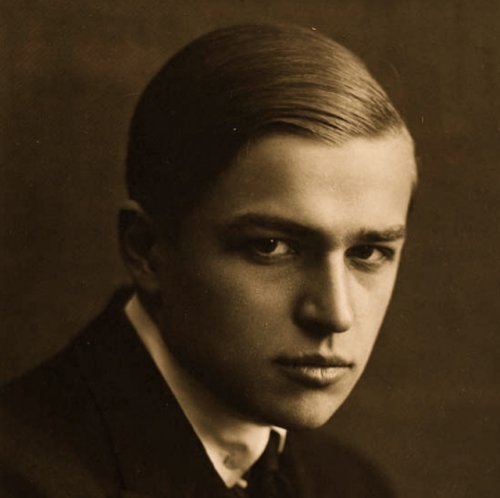
Kojève in 1922
Ironically, though, by stating Hegel clearly and radically, Kojève has pushed Hegel to the breaking point, forcing us to confront the question: Is Hegel’s end of history really the end of history? And if it is, can it really claim to be fully satisfying to man?
Kojève was born in Moscow in 1902 to a wealthy bourgeois family, which, when the communists took over in 1917, was subjected to the indignities one would expect. Kojève was reduced to selling black market soap. He was arrested and narrowly escaped being shot. In a paradox that has called his sanity into question in the minds of many, he left prison a convinced communist. In 1919, he left Russia with the family jewels, which he cashed in for a small fortune in Berlin. (He might be called a limousine communist.)
He studied philosophy in Heidelberg with Karl Jaspers and wrote a doctoral dissertation on Vladimir Solovieff, a Russian philosopher and mystic. In the late 1920s, he moved to Paris. His fortune was wiped out by the Great Depression, and he was reduced to severely straightened circumstances. Fortunately, during the 1920s, Kojève had met and befriended Alexandre Koyré, a historian of philosophy and a fellow Russian émigré, who arranged for Kojève to take over his seminar on Hegel’s Phenomenology of Spirit at the École pratique des hautes études.
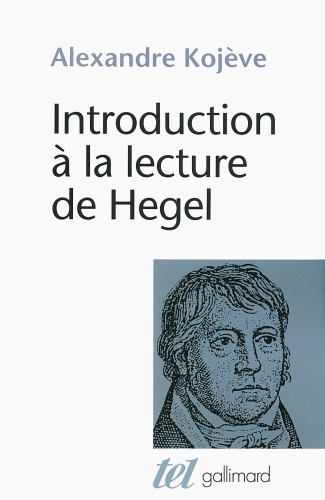 Kojève taught this seminar from 1933 to 1939. Although the seminar was very small, it had a tremendous influence on French intellectual life, for its students included such eminent philosophers and scholars as Jacques Lacan, Maurice Merleau-Ponty, Georges Bataille, Raymond Queneau, Raymond Aron, Gaston Fessard, and Henri Corbin. Through his students, Kojève influenced Sartre, as well as subsequent generation of leading French thinkers, who are known as “postmodernists,” including Foucault, Deleuze, Lyotard, and Derrida—all of whom felt it necessary to define their positions in accordance with or in opposition to Hegel as portrayed by Kojève.
Kojève taught this seminar from 1933 to 1939. Although the seminar was very small, it had a tremendous influence on French intellectual life, for its students included such eminent philosophers and scholars as Jacques Lacan, Maurice Merleau-Ponty, Georges Bataille, Raymond Queneau, Raymond Aron, Gaston Fessard, and Henri Corbin. Through his students, Kojève influenced Sartre, as well as subsequent generation of leading French thinkers, who are known as “postmodernists,” including Foucault, Deleuze, Lyotard, and Derrida—all of whom felt it necessary to define their positions in accordance with or in opposition to Hegel as portrayed by Kojève.
I am convinced that it is impossible to understand the peculiar vehemence with which many French postmodernists abuse such concepts as modernity and metaphysics until one sees that these refer ultimately to Kojève’s reading of Hegel. And this brings us to another reason for reading Hegel and Kojève: It is an ideal tool for understanding French postmodernism, a tremendously influential school of thought. Indeed, it seem that on some academic presses now, every third book contains “postmodern” or one of its cognates in its title.
Kojève’s seminar came to an end in 1939, when World War II broke out. During the German occupation, Kojève joined the French resistance. Or so he said. After the war it was hard to find someone who didn’t claim to have joined the resistance.
After the war, Kojève did not return to academia. Instead, one of his students from the 1930s, Robert Marjolin, got him a job in the French Ministry of Economic affairs, where he worked until his death in 1968. Through his position at the ministry, Kojève exercised almost as great an influence as De Gaulle on the creation of the post-war European economic order. He was the architect of GATT and was instrumental in setting up the European Economic Community. He was also quite prescient in predicting a number of political, economic, and cultural trends. For instance, in the 1950s he was already confident that the West would win the Cold War. He also offers profound diagnoses of the logic of contemporary culture’s obsession with senseless violence and cruelty. Finally, in the late 1950s he glimpsed the logic of Japan’s rising power. Up until his death in 1968, Kojève was a trusted advisor to a number of French politicians, mostly on the right, all the while puzzling his friends by maintaining that he was still an ardent Stalinist. He even bought a house on the Boulevard Stalingrad.
Kojève was fully convinced that history had come to an end in 1806 with the battle of Jena. Accordingly, he held that nothing of any fundamental historical importance had happened since then: not the First World War, not the Second World War, not the Russian and Chinese revolutions. All of these were, in Kojève’s eyes, simply petty squabbles about the implementation of the principles of the French revolution. Even the Nazis were regarded by Kojève as simply history’s way of bringing democracy to Imperial Germany.
Kojève was not, however, convinced that the end of history would mean the complete satisfaction of man. Indeed, he thought that it would spell the abolition of mankind. This does not mean that Kojève thought that human beings would become extinct. He simply thought that what makes us humans, as opposed to contented animals, would be abolished at the end of history.
Kojève held that it was the capacity to engage in struggle over fundamental interpretations of human existence—the struggle for self-understanding—that set us apart from the beasts. Once these struggles are ended, that which sets us apart from the beasts disappears. The end of history would satisfy our animal natures, our desires, but it would offer nothing to satisfy our particularly human desires.
Kojève does not, however, argue that everyone is reduced to a beast at the end of history. Traditionally, human beings have regarded themselves as occupying the space between beasts and gods on the totem pole. When one loses one’s humanity, one can do so either by becoming a beast or by becoming a god.
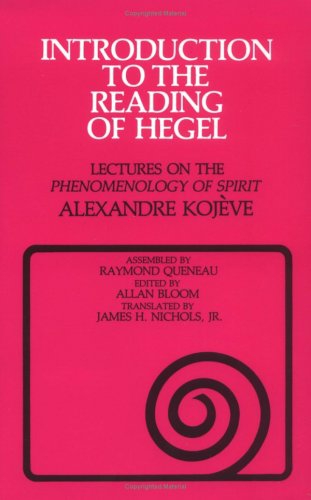 Kojève held that most human beings at the end of history would be reduced to beasts. But some would become gods. How? By becoming wise. At the end of history, the correct and final interpretation of human existence, the Absolute Truth, has been articulated as a system of science by Hegel himself. This system is the wisdom that philosophy has pursued for more than 2,000 years.
Kojève held that most human beings at the end of history would be reduced to beasts. But some would become gods. How? By becoming wise. At the end of history, the correct and final interpretation of human existence, the Absolute Truth, has been articulated as a system of science by Hegel himself. This system is the wisdom that philosophy has pursued for more than 2,000 years.
Philosophy is the pursuit of wisdom, not the possession of wisdom. Hegel, by possessing wisdom, is no longer a philosopher; Hegel is a wise man. In putting the period on history, Hegel brings philosophy to an end as well.
A post-historical god takes up a critical distance from the end of history. He does not live post-historical life. He tries to understand it: how we got here, what is happening, and where we are going — all things we can learn from Hegel and Kojève. If dehumanization is our destiny, at least we can try to become gods, which is reason enough to read Hegel.
Article printed from Counter-Currents Publishing: http://www.counter-currents.com
URL to article: http://www.counter-currents.com/2015/02/why-read-hegel/
URLs in this post:
[1] Image: http://www.counter-currents.com/wp-content/uploads/2015/02/HegelAbsolut.jpg
[2] Image: http://www.counter-currents.com/wp-content/uploads/2013/04/hegel2.jpg
[3] Image: http://www.counter-currents.com/wp-content/uploads/2013/12/Kojeve1922.jpg
[4] Introduction to the Reading of Hegel: Lectures on the Phenomenology of Spirit: http://www.amazon.com/gp/product/0801492033/ref=as_li_tl?ie=UTF8&camp=1789&creative=390957&creativeASIN=0801492033&linkCode=as2&tag=countecurrenp-20&linkId=QQQVCRZ25CGM4EYM
00:05 Publié dans Philosophie | Lien permanent | Commentaires (0) | Tags : philosophie, hegel, idéalisme, kojève, allemagne, 19ème siècle, phénoménologie de l'esprit, dialectique |  |
|  del.icio.us |
del.icio.us |  |
|  Digg |
Digg | ![]() Facebook
Facebook


